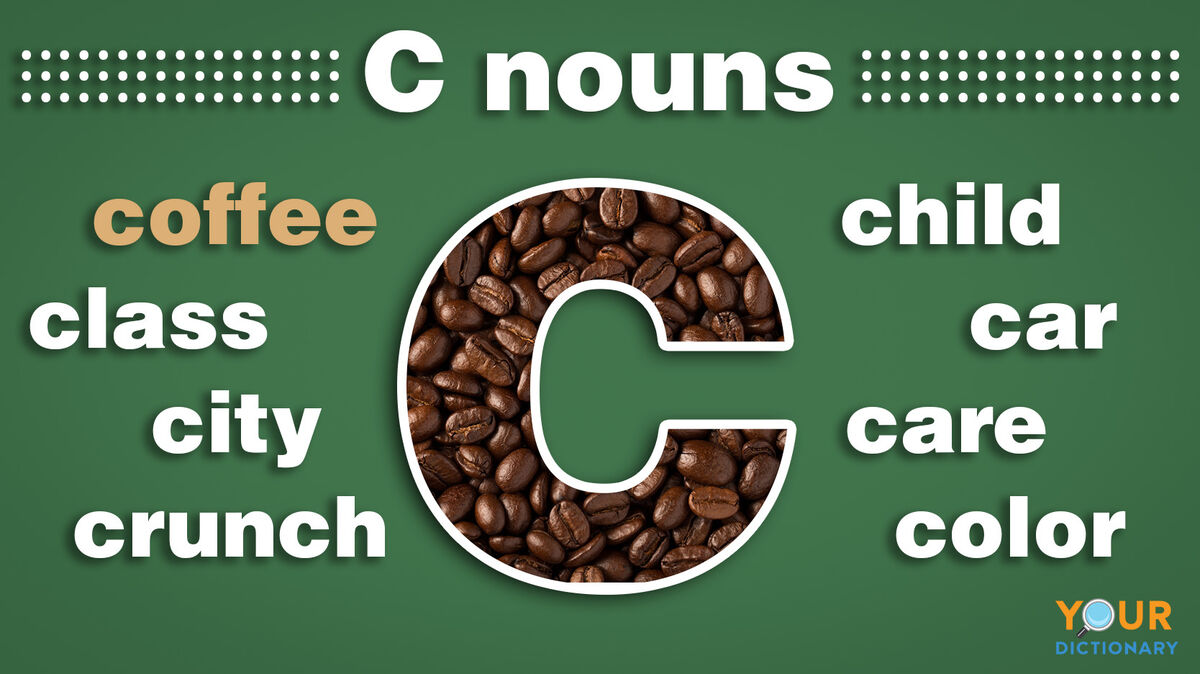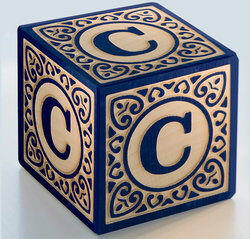
Can you name a person right now? A place? How about a thing? Nouns dominate the English language because they function in so many different capacities. They sit in various sections of nearly every sentence. Given their abundance, sometimes it’s nice to get acquainted with them, letter by letter.
We’ve already explored A and B nouns. Now, let’s progress into a sea of C nouns.
50 Nouns Starting With C
The cardinal rule when studying English grammar is to keep an open mind. Many words are shapeshifters and can function as different parts of speech. Let’s put on our noun hats and explore 50 words functioning in their noun capacities.
Noun | Definition | Synonym |
a disease with growths that damage the body | carcinoma, tumor, growth | |
wealth used to create more wealth | assets, resources, principal | |
an automobile that carries people or goods | automobile, coach, vehicle | |
a flat, stiff, thick piece of paper used to express a greeting or play a game | placard, ticket, sheet | |
a red songbird with a noticeable crest and stout bill | bird, songbird | |
close attention or concern for another | concern, empathy, interest | |
what you do for a living | occupation, vocation, work | |
currency and coins | capital, clink, money | |
a small area in a prison where criminals are kept behind bars | cage, compartment, vault | |
the point equally distant from all sides | middle, heart, hub | |
an act of rebellion against someone or something | dispute, objection, protest | |
happening by unexplainable reasons, luck, a risk, or the likelihood of something happening | fate, gamble, risk | |
a trait, quality, or high moral code | integrity, reputation, personality | |
a very young person | kid, adolescent, juvenile | |
the act of making a selection | judgment, option, decision | |
a holiday celebrated as a religious tradition commemorating the birth of Jesus | christmastide, holiday, yule | |
a record of things that have happened in the order which they happened | account, archives, record | |
the building where religious worship takes place | chapel, sanctuary, synagogue | |
a town of significant size | metropolis, town, municipality | |
\a group of students taught together | group, section, grade | |
a customer or person who uses a service | buyer, consumer, customer | |
a group of people who come together for a common interest | association, consortium, fraternity | |
disarray, a disorganized mess | jumble, chaos, hodgepodge | |
a set of rules | canon, instructions, law | |
a drink made from ground and roasted beans | java, joe, espresso | |
a group of things or people gathered together | accumulation, gathering, assortment | |
a place of higher learning after high school | institute, university, conservatory | |
a component of light which is separated when it is reflected off an object | hue, chroma, iridescence | |
the people living in an area | neighborhood, district, locale | |
a guest or a group of people associated with each other | assembly, association, troupe | |
an electronic device used for processing information | PC, workstation, machine | |
a victory in love or war | mastery, triumph, conquering | |
permission given for something | acquiescence, concession, assent | |
a feeling of scorn toward another person | disdain, hatred, malice | |
what is inside or included in something | filling, load, measure | |
power to direct | command, authority direction | |
the inside of something | base, center, hub | |
the amount paid for something | payment, charge, value | |
something that functions as someone or something else | copy, duplicate, equal | |
a nation | realm, land, sovereign state | |
an administrative division of a state or country | borough, district, division | |
two items of a similar kind | duo, twosome, pair | |
the bravery and/or strength to do something that could be dangerous | bravery, valor, boldness | |
a class you take in school to study a particular subject | lecture, class, seminar | |
a building or room where legal cases are heard and decided by a judge | tribunal, judiciary, chancery | |
the quality of being credible or trustworthy | credence, reliance, confidence | |
unkind or mean acts | brutality, inhumanity, barbarity | |
a critical moment when time or resources are running out | crisis, difficulty, emergency | |
the act of nurturing and causing growth | tilling, plowing, growing | |
a buyer of goods, services | client, patron, buyer |
What Is a Noun?
We see, touch, and think about nouns all day long. A noun is a person, place, thing, or idea. How many times today have you thought about a cup of coffee or the cell phone sitting on your desk? When we use nouns in our writing, we often place articles before them, such as “a,” “an,” or “the.”
One of the most important roles nouns have is to act as the subject of the sentence. So, in the sentence, “The church is magnificent,” “church” is a noun. Nouns are also frequently direct objects. In the sentence, “Francis fed the cat,” “cat” (with the addition of the article “the”) is the direct object, or the object of the verb “fed.”

Types of Nouns
There are several types of nouns. Here are a few of the most common:
- Proper nouns name specific people, cities, states, countries, buildings, books, and more. Proper nouns must be capitalized. So, “Cleveland” is a proper noun, but “city” is a common noun.
- Common nouns refer to general things, such as “cola,” instead of “Coca-Cola.”
- Abstract nouns refer to things we can’t taste, touch, or see. They’re theoretical, such as “comfort” or “capitalism.”
- Collective nouns refer to large groups, such as a “class” of students or a “company” of soldiers.
- Possessive nouns illustrate ownership over something else. For example, with “Carrie’s dominoes,” “Carrie’s” is a possessive noun, indicating the dominoes belong to her.
To continue to explore these categories, check out Types of Nouns.
10 Example Sentences
You may have recognized some of the above words as verbs, or other parts of speech. But, let’s take a look at them acting specifically as nouns:
- He invested a lot of capital in her new company.
- We watched the red cardinal fly.
- She forced him into a dangerous challenge.
- Her short story was a detailed chronicle of Sir Arthur’s life.
- Shakira is her newest client.
- There’s no better way to start each day than with a cup of coffee.
- Nothing in the world is worse than clutter.
- His mother gave him consent to take the class.
- We moved into a new community of wonderful people.
- Gardening takes a lot of tender cultivation.
Clans of Nouns
Not only are there many different types of nouns, but they also encompass nearly every letter of the alphabet. With these cases of nouns in your back pocket, make sure you’re walking with us through the entire alphabet. Let’s start back at Nouns That Start With A. There are quite a few nouns that begin with C, but words that start with this letter aren’t all nouns.
Discover many additional nouns using the word list tool on WordFinder by YourDictionary. Just go to words that start with the letter C for a long list of words from a variety of different parts of speech. Then, create your own custom word list via the on-screen filter. It’ll let you pull up words that include, start or conclude with certain letters or combinations of letters or limit word length. What a great way to curate your own collection of c-words to consider!